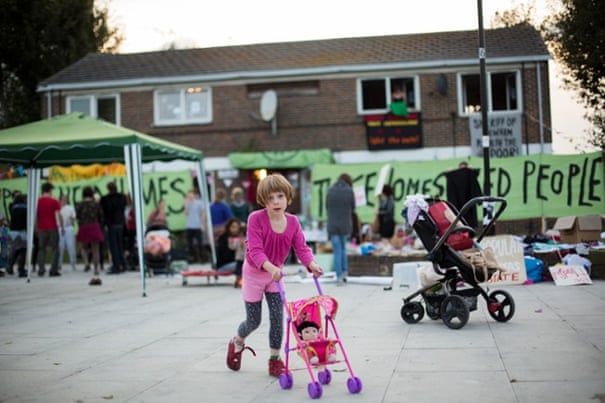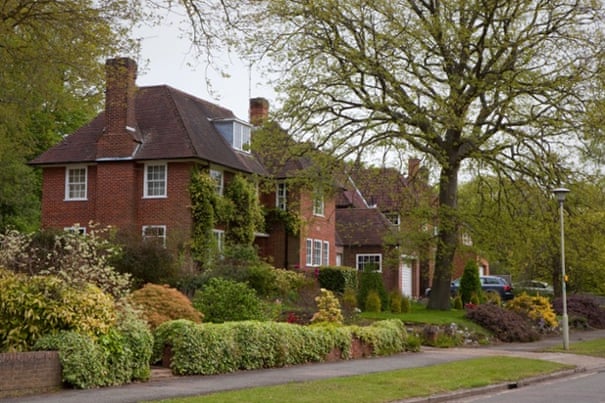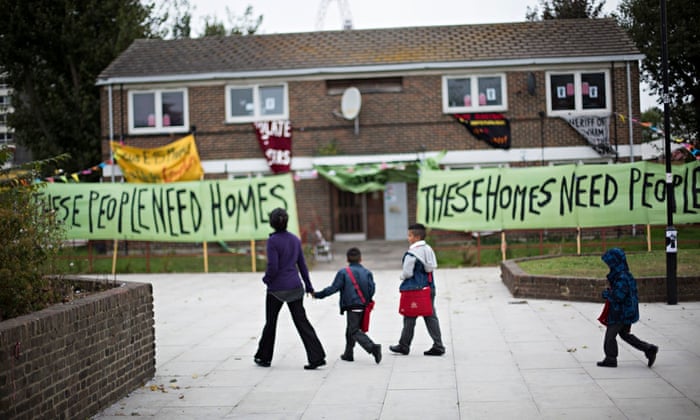“Every day I cry,” says an activist on a stall in Stratford, east London, that is shared by housing campaign Focus E15 and the Revolutionary Communist party. “How many thousands of people are suffering?”
Mark Carney, governor of the Bank of England, has said that problems with housing are the “biggest risk” to the UK economy. The CBI agreed, saying: “A perfect storm is brewing in the housing market. Now is the time for action.”
If there is one thing that revolutionary communists and bankers can agree on, it is that there is a housing crisis in Britain. There are too few homes, usually costing too much, often in the wrong places, and often of poor quality. The crisis damages lives, breaks up families, blights employment prospects, reduces mobility and slows the economy.
This, you would have thought, would be a gift for any political party. Housing is a matter of vital importance to voters. At a time when all parties struggle to offer alternatives to each other, this would be an opportunity to be distinctive and take the lead. Yet all the main parties’ offerings on the subject are piecemeal, gestural and unambitious.
Back in east London, the young mothers of Focus E15 became celebrities when they occupied vacant council properties on the edge of the Olympic Park in the London borough of Newham. They had been told by the Labour council that they were to be rehoused outside the capital – part of a city-wide tendency to send its homeless people to places as far-flung as Bristol, Hastings and Stoke-on-Trent.
Their protest won them a reprieve, but thousands of others are not so lucky: at the Focus E15 stall you hear of families evicted by council-hired bailiffs who break in at 6am, often acting on tenuous legal authority. You hear of schooling disrupted, jobs lost, support networks broken and relocation putting impossible distances between friends and relatives.
The price of housing is a problem that runs across most social classes. In London, the south-east, much of rural Britain and several of the more desirable cities, you can be young, employed and even well-paid and have little prospect of acquiring a decent home. Britain was once famous as a country of houses with gardens, accessible to manual workers and clerks, but in many areas this is now a distant fantasy to those without property-rich parents to help them.
If the most conspicuous issues are about homes costing too much, there are also places where they cost too little. In Accrington, Lancashire, a two-bedroom house might be worth £40,000, which is less than it would cost to refurbish and repair it. This means that it is not worth the owners – often absentee landlords – investing in their maintenance. Roofs leak, mould grows on walls, condensation forms and heating bills rise in poorly insulated buildings.
According to Daniel Klemm of the north of England housing association Together Housing, which is working with property company Better Places, “a spiral of decline sets in”, where the physical environment deteriorates, which further deters investment. Those who can, leave, and those who stay have few prospects of employment. In a place like this you can have a home but no job; in high-value areas you can have a job, but no home.

The housing crisis is an accelerating human disaster. It is creating exploitative landlords, overcrowding and poor-quality homes. Private renters spend 40% of their income on housing. It is shocking that many people in their 20s now regard it as an accepted fact that they will never have much by way of a home.
It is wrong that having a home in many rural areas, or in London, should be regarded as a luxury. This applies even to traditionally poor London boroughs. “If you can’t afford to live in Newham,” the borough’s mayor told the Focus E15 mothers, “you can’t afford to live in Newham.” But these people hadn’t asked for their neighbourhood to become a high-performing investment asset, and they gain nothing from the change.
High house prices, which owe much to policies promoted by Margaret Thatcher’s government, pervert the promises of Thatcherism. If you work hard and are thrifty, she said, you will be rewarded. Yet people who own property can make more money from sitting on it than by doing a job, while others will never get on the property ladder however hard they strive. If you get on your bike to look for work, as her minister Norman Tebbit urged, you might have to pedal a hundred miles or more back to where you live.
Property values are distorting human values. But if politicians are incapable of making an argument based on ideas of a fair or fulfilling society, there are also economic reasons for addressing the problems of housing. It’s hard to run a business if your employees find it hard to get a home. If people on low and middle incomes are pushed out, big cities will in course lose those who make, maintain and repair things, who care for the ill and old, who clean, who cook and wait in restaurants, and who look after and teach children. The creative and inventive types, currently such a big part of London’s sales pitch to the world, will go too.
The most obvious cause of Britain’s housing is the simple operation of supply and demand. The country’s population is increasing, and we like to live in smaller units than in the past. A figure of about 240,000 is consistently estimated as the amount of new homes Britain needs each year, and with equal consistency it is never achieved. In 2014, fewer than 120,000 were built. The most commonly given reason for this undersupply is that Britain is short of land and that it has a planning system which, for good reasons, wants to protect the beauties of the countryside.
These arguments are only part of the story. Another reason is that inflation in housing – so taboo when it comes to other commodities – has since the 1980s been celebrated by governments and encouraged by policies on taxation and borrowing. Prices are pushed up further by recent initiatives such as the changes to pension pot rules which allow people 55 and over to invest theirs in property. Meanwhile, the Thatcher government stopped local authorities from building more housing. Right To Buy took affordable homes out of the available stock and were not replaced. Some were resold as investments, and rented out for profit. A wasteful loop was created, whereby councils now find themselves paying high rents to private landlords, in order to house their homeless in properties that once belonged to the council.
It is also too simple to say that Britain is short of land. “The notion that there is no land left really is nonsense,” says David Orr, chief executive of the National Housing Federation. “Nine per cent of the country is developed and that includes roads, factories and so on: only 2% is housing.” The challenge is rather to find places that do not affect somebody’s view, somebody’s dog-walking route and somebody’s property prices.
The combined effects of demand, government stimulants and restrictions on supply consistently push house prices above other forms of inflation, making residential property an attractive speculative investment. The investors might be British individuals who take the perfectly rational decision to buy and rent out homes as a way of providing for their old age. They might also be overseas investors who, also rational and encouraged by, among other things, non-dom tax breaks, see British property as a safe bet.
The crisis in house prices is therefore not an act of pure economic fate but constructed and willed by policy over decades. As such, it can also be defused by policy, if not easily or quickly. So far, the main government response has been to try to relax planning rules and to encourage the market with measures such as Help To Buy which, presented as much-needed assistance to first-time buyers, tend to push up prices further.
There is a confusion here between the problems of availability and affordability. If the only way to encourage building in larger numbers is to put up prices, this is no help for the people who cannot afford a home. The underlying belief is that the market will provide, if only it were properly stimulated and enticed, but it is one unsupported by evidence. At no time since the second world war has the private sector built at the rate now required, and usually it has fallen a long way short. The only time when the total housing numbers exceeded those now thought essential was in the 1950s and 1960s, when council housing accounted for half the figure.
By itself, the market does not provide. One reason for this is that never, not even in the wildest libertarian fantasy, will there be no planning. It is something that, despite criticisms, everyone wants: we complain about faceless bureaucrats, but when something we don’t like comes down our street, we want them to defend us. Where there is planning, the market cannot operate as freely as it would in trading, say, ironmongery. The other factor is called absorption: if developers start building in sufficient numbers to make homes cheaper or slower to sell, they stop.
The public sector has to build more itself. It also needs to plan more constructively and actively, creating positive proposals for what new places could be, which also recognise and allay the reasonable fears of existing residents. The idea of greater public involvement will raise spectres of the famous failings of mass public housing in the past, but this is to ignore the successes of postwar public development (in many new towns, for example, and in several now sought-after council estates) and to assume that it is impossible to learn from and improve on mistakes.

The Homes for Britain campaign, which brings together housing associations, private house builders, landlords, planners and architects, is holding a rally in Westminster. It aims to solve the housing crisis “in a generation”, which is a realistic time frame, given that it has taken a generation to create the current situation. It would be foolish of anyone to suggest that the solutions are easy and obvious, but a party serious about improving the housing of the country should consider these:
1 Make zero inflation a target
In the same way that targets are set for retail prices, it could be stated that it is desirable to stop house prices rising. In real terms they would slowly fall to affordable levels, and the heat would be taken out of speculation, but no one would be put into negative equity. Inflationary incentives like Help To Buy should be ended, and taxation should be used to deflate property bubbles.
2 End the obsession with owner-occupation
Good though it is for many people, owning your own home is neither desirable nor possible for many. It also encourages an approach to development that relies on continuing increases in value. Other options, such as renting from private or public landlords, should be equally attractive and viable.
3 Use every tool in the box
Politicians of all main parties have declared their wish to create garden cities. This is well and good, but requires a level of will and expertise not so far evident, and only goes so far. The scale of the need also requires every option to be considered. This includes building on ex-industrial land, in many small increments as well as through large plans, and increasing the density of existing cities and suburbs.
4 Build – carefully and well – in green belts
Restricting urban sprawl and protecting natural landscapes, the country’s green belts are one of the triumphs of British planning. But some of their land is of little environmental or economic value. Last year planning consultancy Urbed showed that green belts can be built on responsibly, allowing more people to live close to nature. There is no good reason not to realise some of these ideas.
5 Make neighbourhoods
The University of Cambridge, faced with the impossibility of housing its staff in an expensive city, is working with local authorities to create well-planned, good-quality new neighbourhoods, with high environmental standards and well designed communal spaces. Examples like this, which show that new homes do not have to be a form of pollution, should be followed across the country.
6 End discounts on right to buy
At a time when some people are being ejected from their homes in the name of austerity, it is grotesque that others are being offered lavish discounts to buy their local authority homes – often so that they can resell them for a quick profit.
7 End vindictive benefit cuts
The benefit cap unfairly punishes people living in areas that have become expensive by making it impossible for them to pay their inflated rents. The bedroom tax is mean-spirited and destructive. Both should end.
8 Act regionally
The needs of Lancashire, Cambridge and Newham differ widely. There should be the ability to make different measures in different areas.
9 Put a secretary of state for housing in the cabinet
As the renters’ campaign group Generation Rent has proposed, the issue is big enough to be represented at the highest level of government.
10 Let councils borrow to build
For the first time since the 1980s, councils are now allowed to build housing again. To do this more and better, they should be able to borrow money against their considerable assets, rather than form partnerships with private property companies who take 20% of the proceeds in profit. New council housing should not be a last resort only for those in the most desperate need, but suited to a range of incomes.

The obvious objection to some of these proposals will be that there is no money. But money is already being wasted – on paying housing benefit to private landlords for example, on right-to-buy discounts, and on the profits developers make on publicly owned land. It is partly a question of spending it better.
There is also what Ebenezer Howard, the inventor of garden cities, called the “unearned increment”, which is the uplift in value when land becomes available for housing. It was the basis on which postwar new towns were built. Currently it is being squandered – when the government, for example, relaxes planning constraints on certain properties, or makes it easier to convert offices or shops into homes they drench the lucky owners of such places in cash, without asking for much in return.
House price inflation is an addiction. It is destructive and divisive. It is a tax by the haves on the have-nots, and by the old on the young.
It makes for more losers than real winners – if you own your home, its rising price is of little use to you unless you want to downsize, in which case you can never return to your previous position on the ladder. The only real beneficiaries are those who own more property than they need for their own living.
Thatcher’s property-owning democracy has run its course. It is time for a new model.


